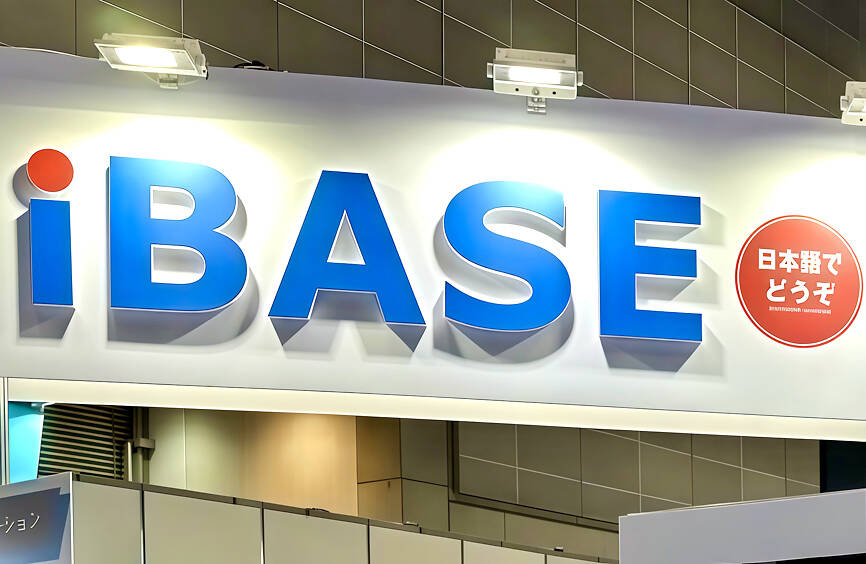Industrial computer maker IBASE Technology Inc (廣積) yesterday reaffirmed its target of achieving double-digit revenue growth this year, projecting an even split in full-year revenue between the first and second halves.
The company reported a 32.36 percent year-on-year increase in first-half revenue to NT$3.05 billion (US$101.9 million), largely attributed to a lower base from the previous year.
IBASE manufactures single-board computers used in automation control, Internet security, point-of-sale (POS) systems, ATMs and portable devices.

Photo courtesy of IBASE Technology Inc
The Taipei-based company also provides embedded systems for drone controllers, edge computing, medical equipment and smart transportation, as well as advanced system products for data storage, surveillance, high-end servers and industrial automation, its Web site says.
Third-quarter revenue is expected to surpass that of the second quarter, but fourth-quarter sales might decline due to a reduced order forecast from a major US Internet communication client, after mass production of its products began in the second half of last year and drove growth in the first half, IBASE president Albert Lee (李家富) said.
The sharp appreciation of the New Taiwan dollar against the US dollar since early May also eroded second-quarter revenue, Lee said, without disclosing the size of the decline.
However, as revenue contributions from its deployment in the Japanese market are expected to begin in the fourth quarter, the company is maintaining its target to grow full-year revenue above last year’s level, he said.
The company has secured a major order to supply industrial motherboards for ATMs to a Japanese customer, with revenue contributions expected to begin in the second half of next year, Lee said.
IBASE has also secured orders from a Japanese warehouse operator planning to launch a new autonomous mobile robot (AMR), and an original design manufacturer in the country, he added.
The company expects to begin small-volume shipments of ATMs, AMRs and other products to the Japanese market in the fourth quarter of this year, with mass production slated for the first quarter of next year, after which the market is expected to contribute more than 10 percent of total revenue, Lee said.
Meanwhile, US President Donald Trump’s administration last week announced a 20 percent tariff on Taiwanese goods, set to take effect tomorrow, although the impact on the company’s products is still pending the outcome of the ongoing Section 232 investigation under the US Trade Expansion Act of 1962, Lee said.
However, as Washington is expected to tighten rules on country-of-origin labeling, IBASE plans to negotiate with customers to ship complete systems instead of individual components to minimize tariff exposure, he said.
IBASE operates manufacturing facilities in New Taipei City’s Sanchong (三重) and Sinjhuang (新莊) districts, as well as in Taoyuan’s Pingjhen District (平鎮), and the company is constructing a new plant in Vietnam, with hardware installation and pilot production expected to begin in the fourth quarter, Lee said.
The Vietnamese facility would operate in tandem with its Taiwan operations to ensure production flexibility, he said.

Taiwan Semiconductor Manufacturing Co (TSMC, 台積電) last week recorded an increase in the number of shareholders to the highest in almost eight months, despite its share price falling 3.38 percent from the previous week, Taiwan Stock Exchange data released on Saturday showed. As of Friday, TSMC had 1.88 million shareholders, the most since the week of April 25 and an increase of 31,870 from the previous week, the data showed. The number of shareholders jumped despite a drop of NT$50 (US$1.59), or 3.38 percent, in TSMC’s share price from a week earlier to NT$1,430, as investors took profits from their earlier gains

In a high-security Shenzhen laboratory, Chinese scientists have built what Washington has spent years trying to prevent: a prototype of a machine capable of producing the cutting-edge semiconductor chips that power artificial intelligence (AI), smartphones and weapons central to Western military dominance, Reuters has learned. Completed early this year and undergoing testing, the prototype fills nearly an entire factory floor. It was built by a team of former engineers from Dutch semiconductor giant ASML who reverse-engineered the company’s extreme ultraviolet lithography (EUV) machines, according to two people with knowledge of the project. EUV machines sit at the heart of a technological Cold

TAIWAN VALUE CHAIN: Foxtron is to fully own Luxgen following the transaction and it plans to launch a new electric model, the Foxtron Bria, in Taiwan next year Yulon Motor Co (裕隆汽車) yesterday said that its board of directors approved the disposal of its electric vehicle (EV) unit, Luxgen Motor Co (納智捷汽車), to Foxtron Vehicle Technologies Co (鴻華先進) for NT$787.6 million (US$24.98 million). Foxtron, a half-half joint venture between Yulon affiliate Hua-Chuang Automobile Information Technical Center Co (華創車電) and Hon Hai Precision Industry Co (鴻海精密), expects to wrap up the deal in the first quarter of next year. Foxtron would fully own Luxgen following the transaction, including five car distributing companies, outlets and all employees. The deal is subject to the approval of the Fair Trade Commission, Foxtron said. “Foxtron will be

INFLATION CONSIDERATION: The BOJ governor said that it would ‘keep making appropriate decisions’ and would adjust depending on the economy and prices The Bank of Japan (BOJ) yesterday raised its benchmark interest rate to the highest in 30 years and said more increases are in the pipeline if conditions allow, in a sign of growing conviction that it can attain the stable inflation target it has pursued for more than a decade. Bank of Japan Governor Kazuo Ueda’s policy board increased the rate by 0.2 percentage points to 0.75 percent, in a unanimous decision, the bank said in a statement. The central bank cited the rising likelihood of its economic outlook being realized. The rate change was expected by all 50 economists surveyed by Bloomberg. The